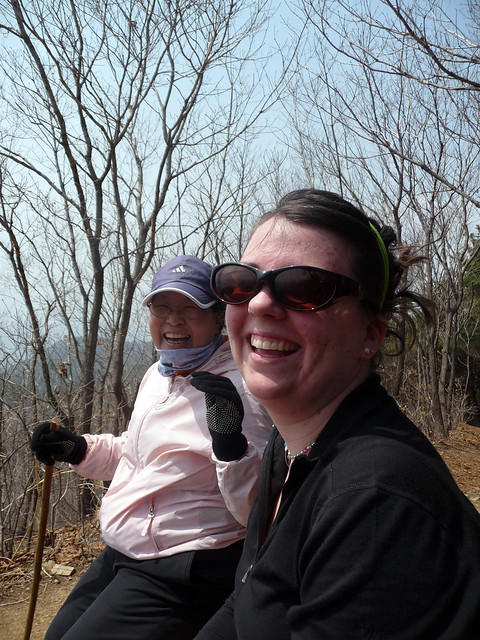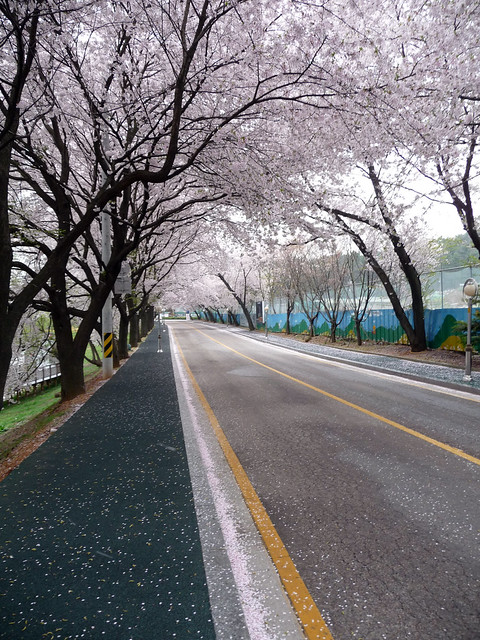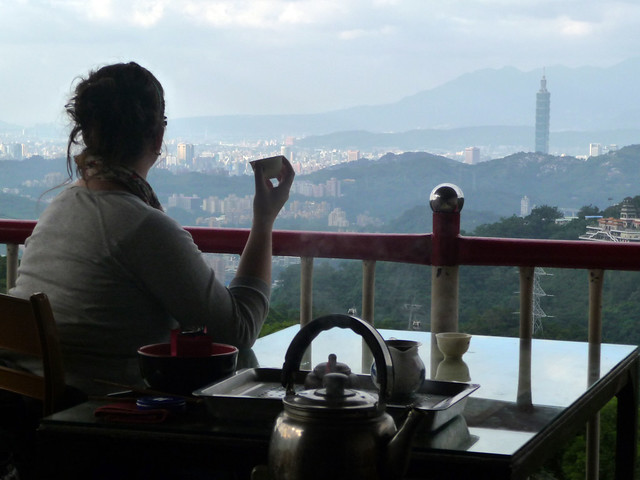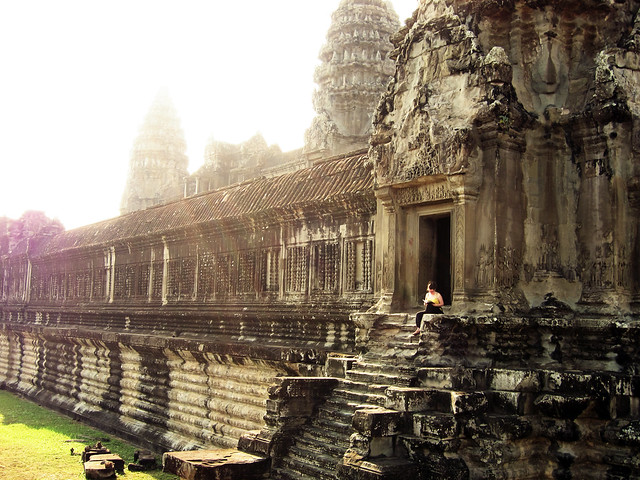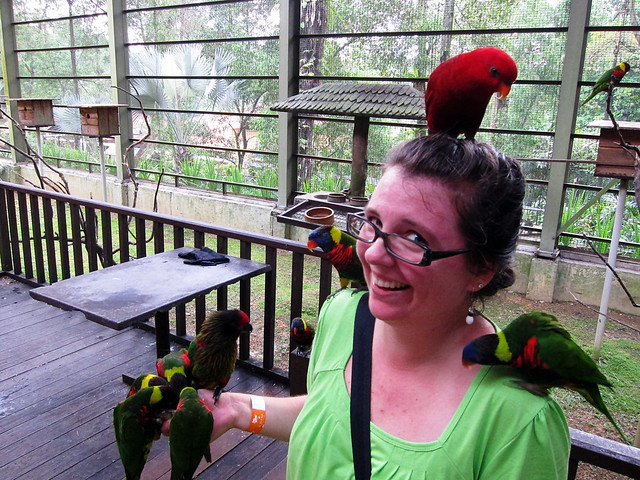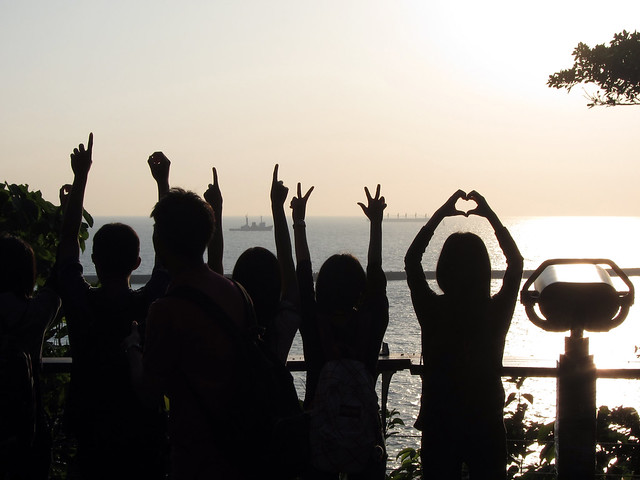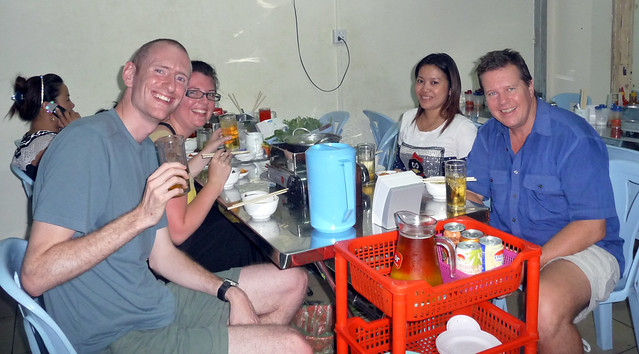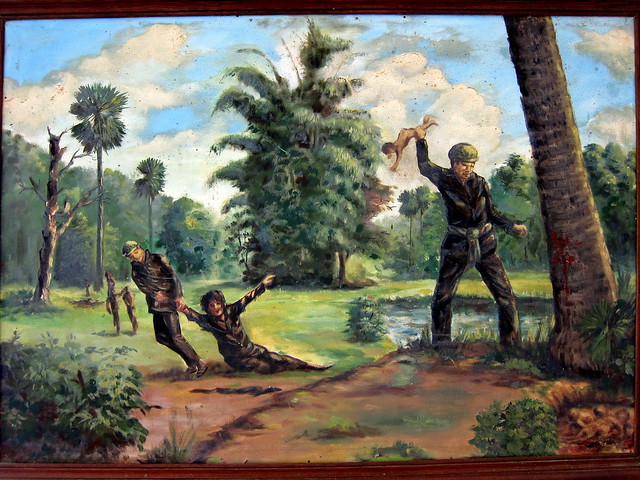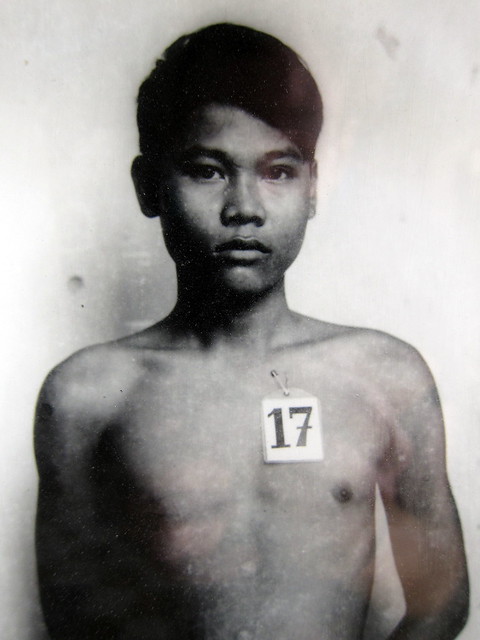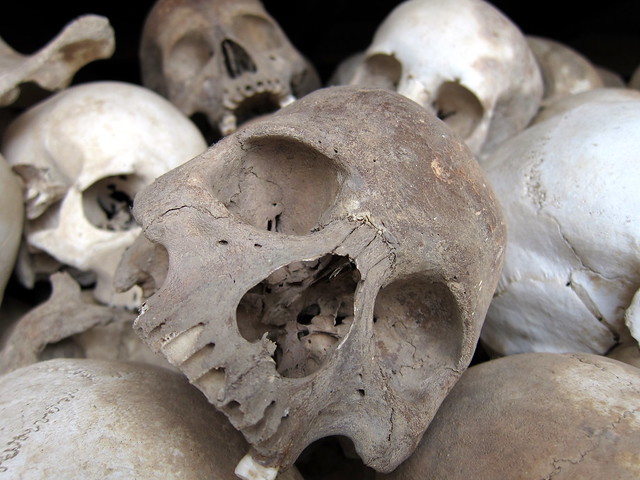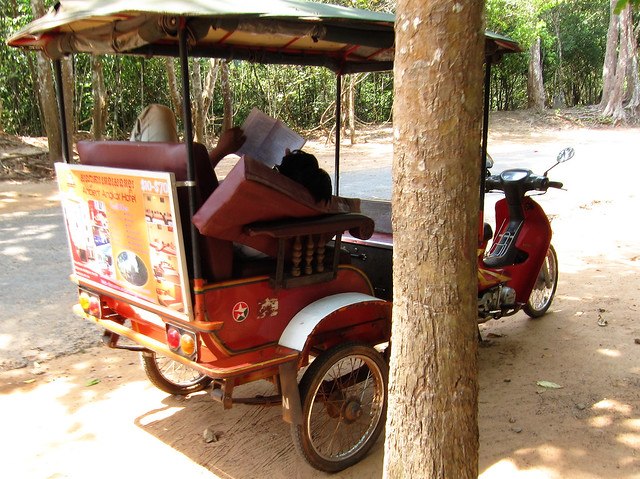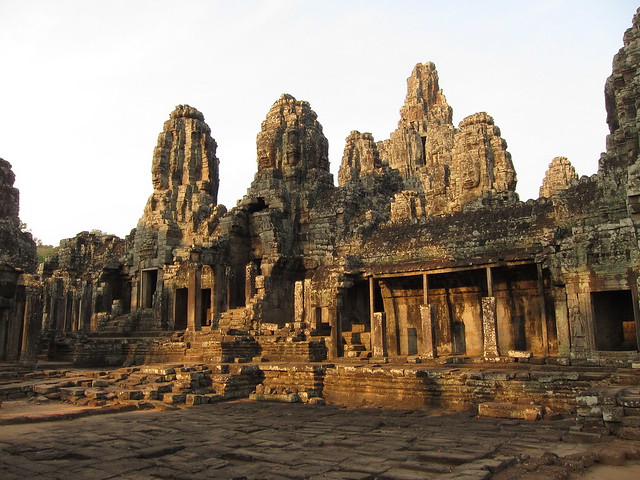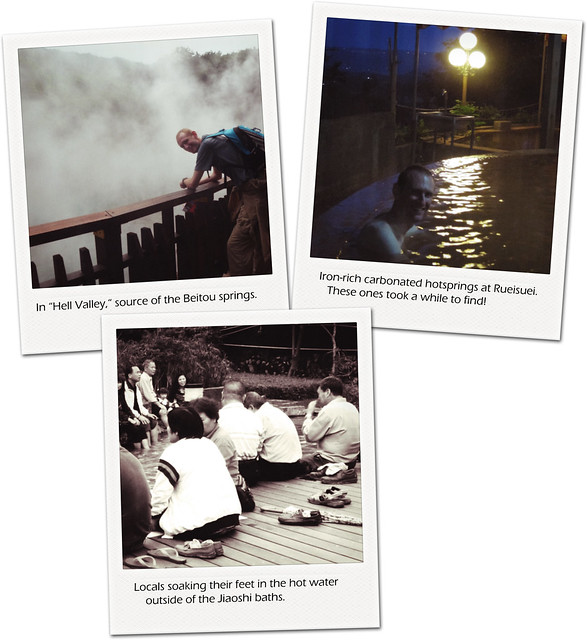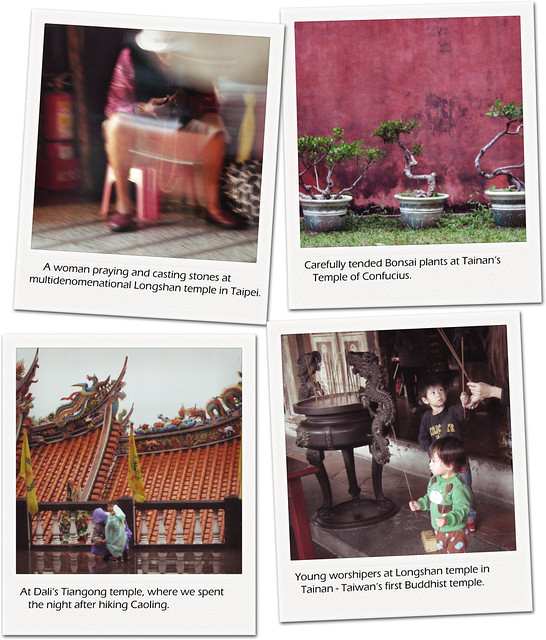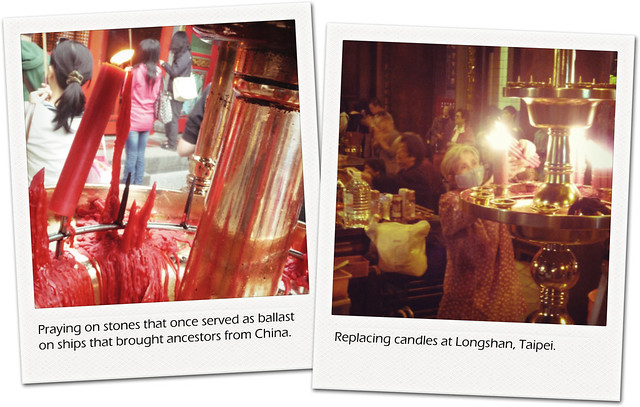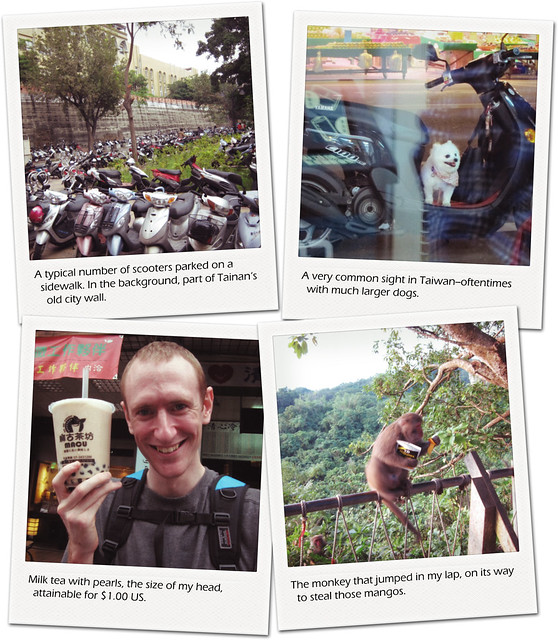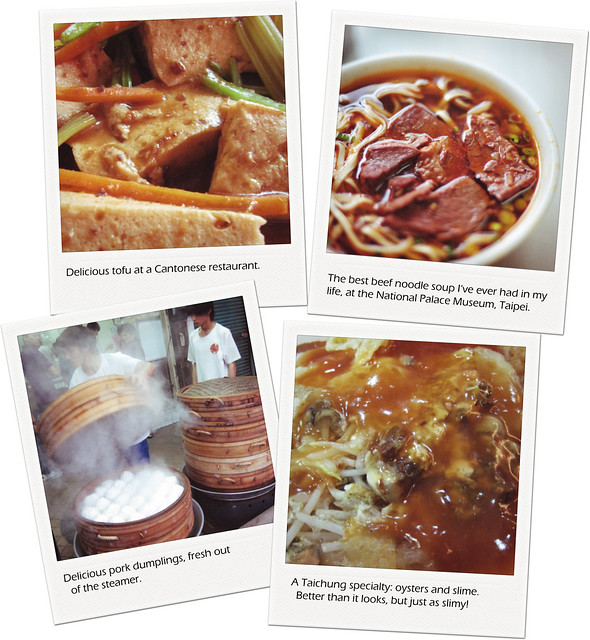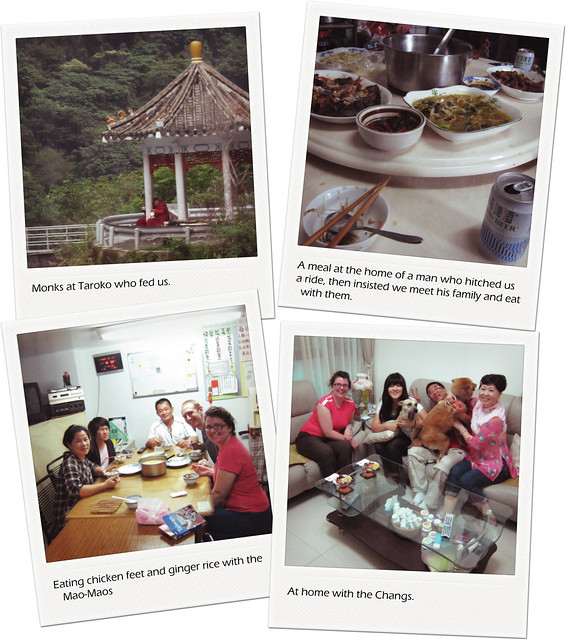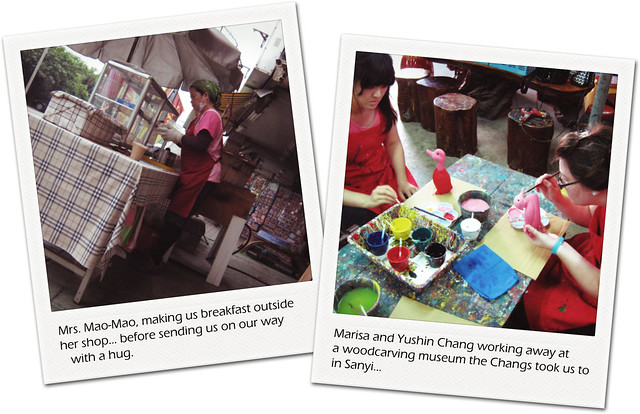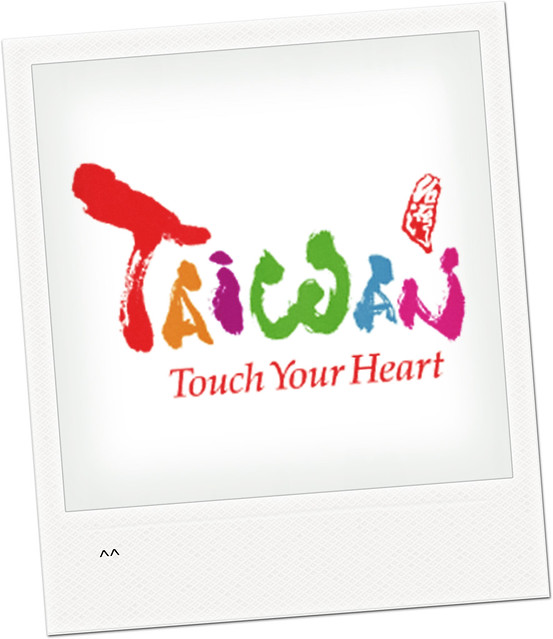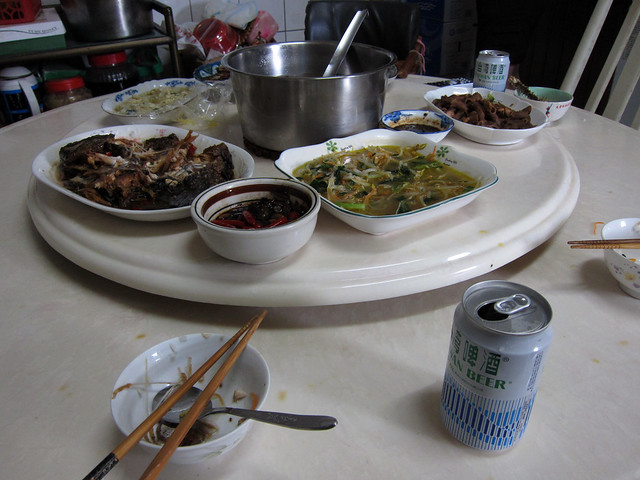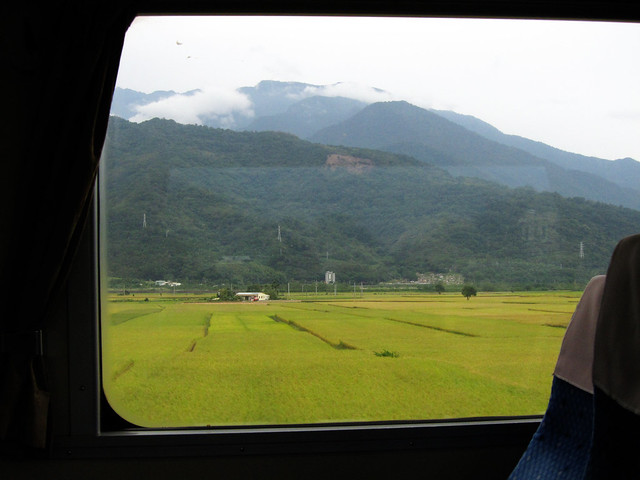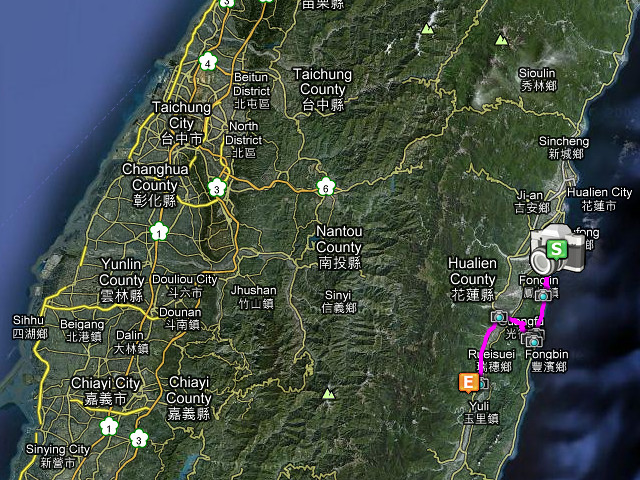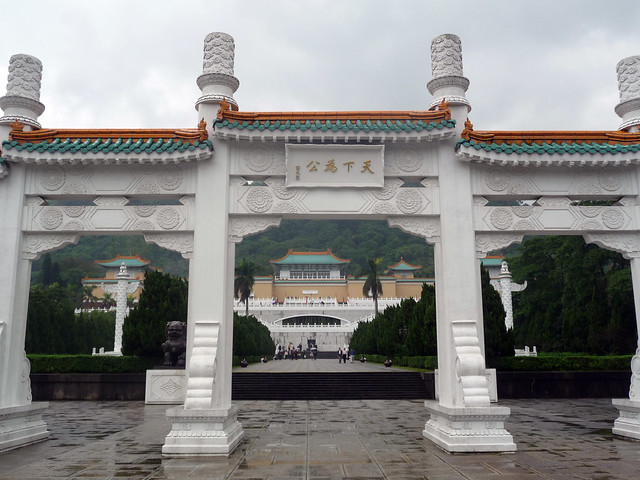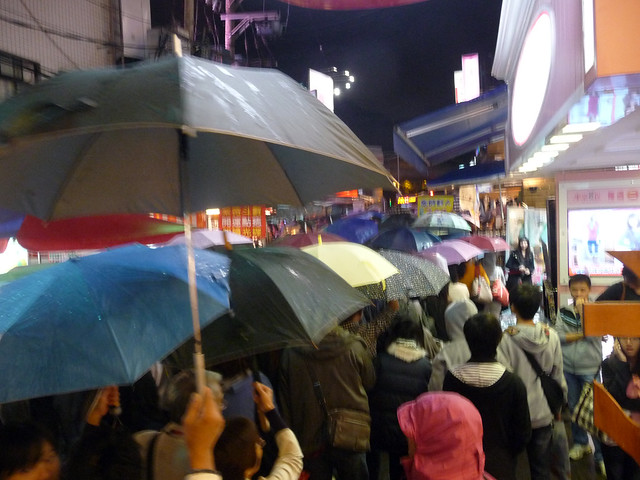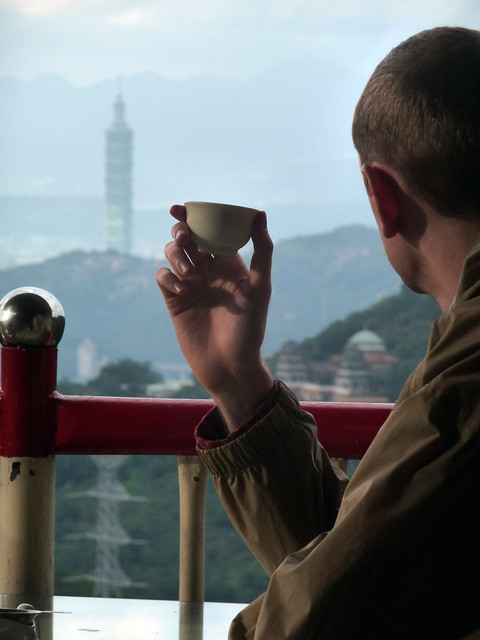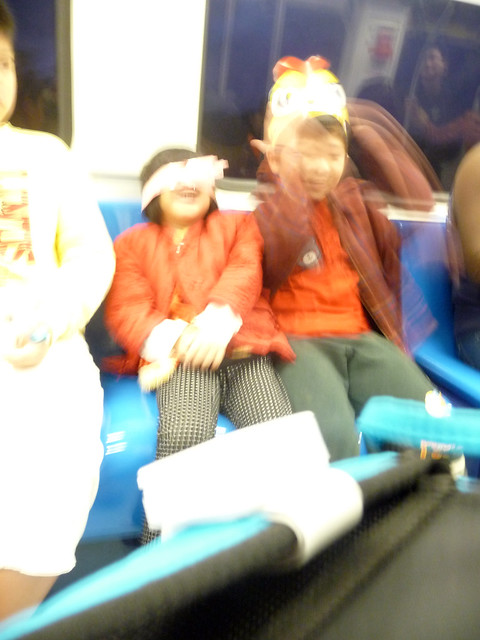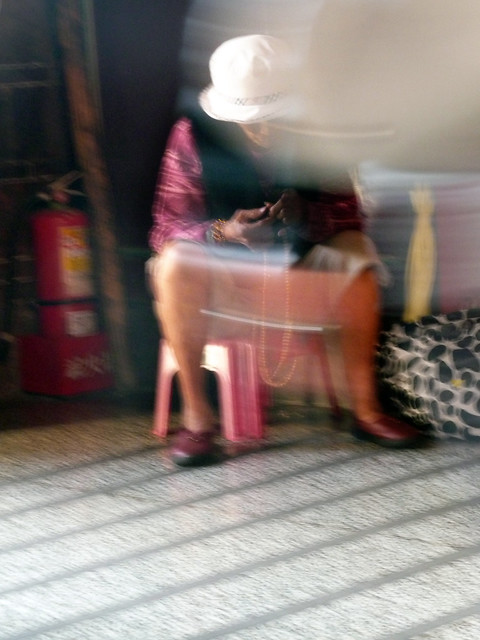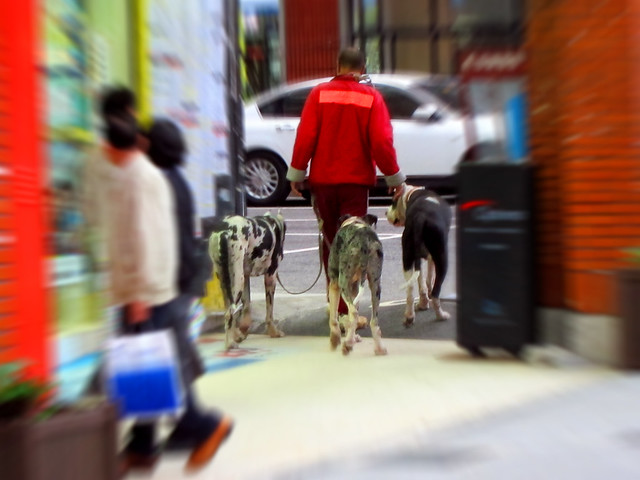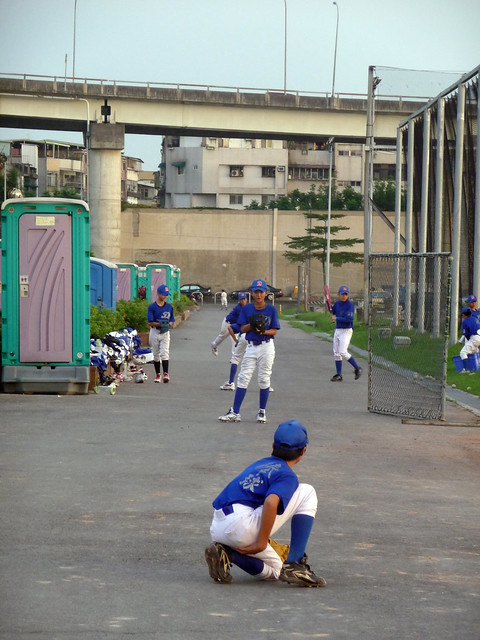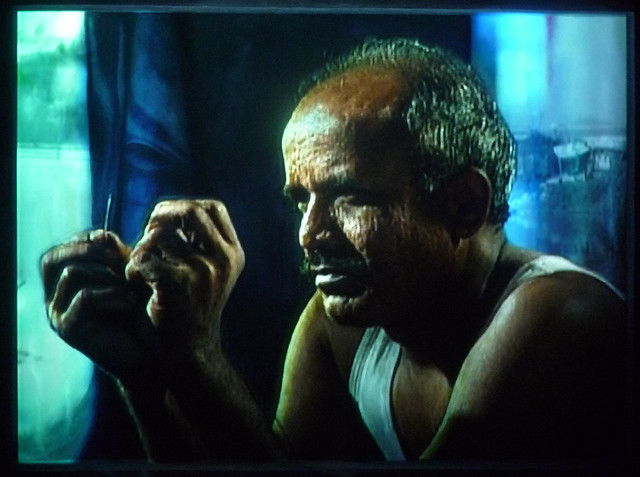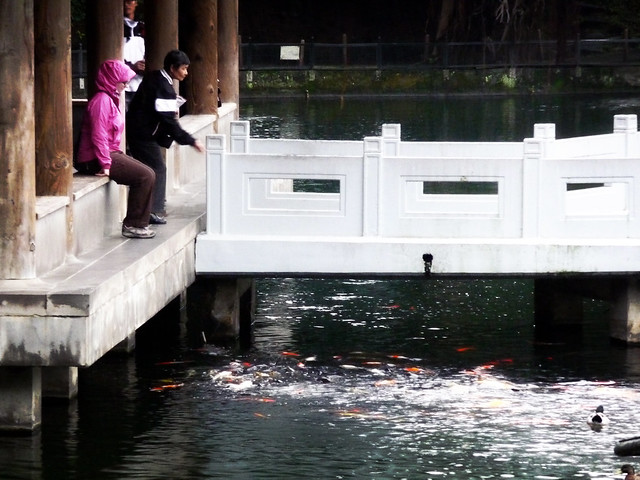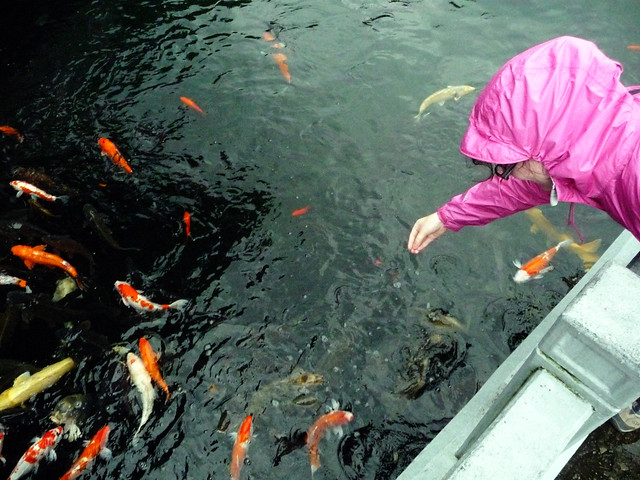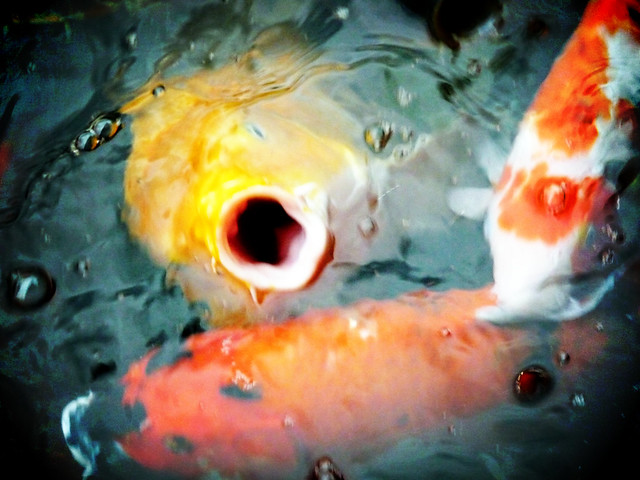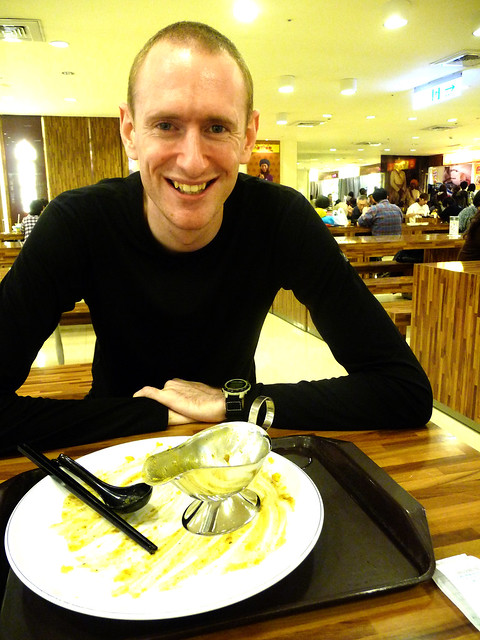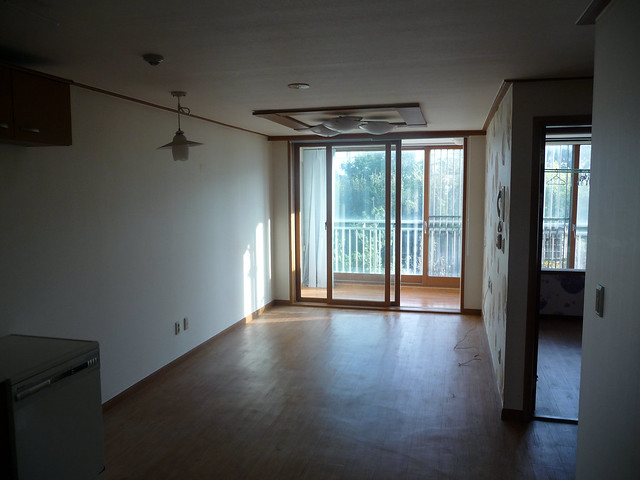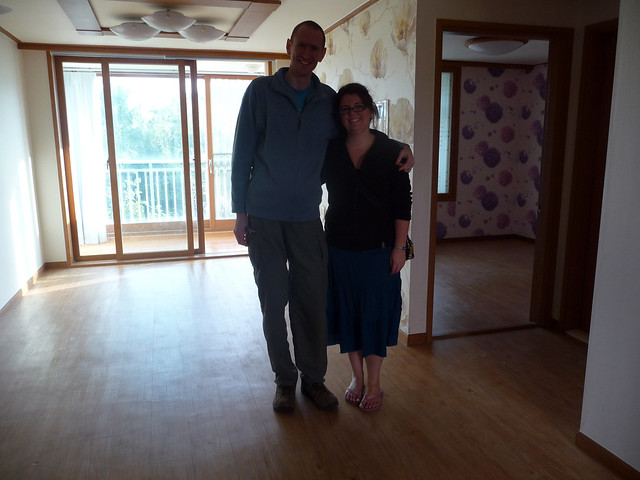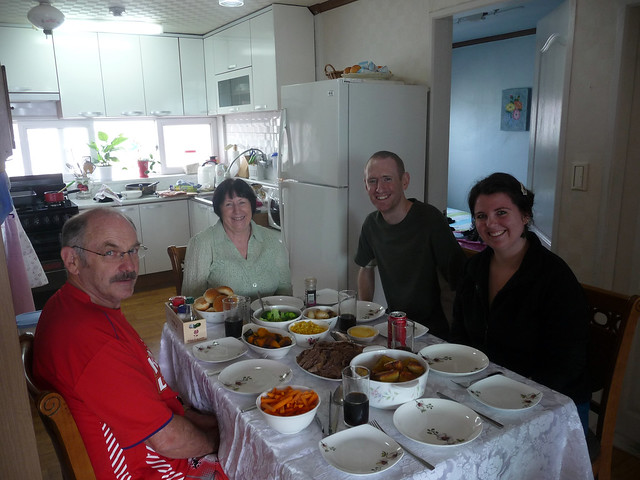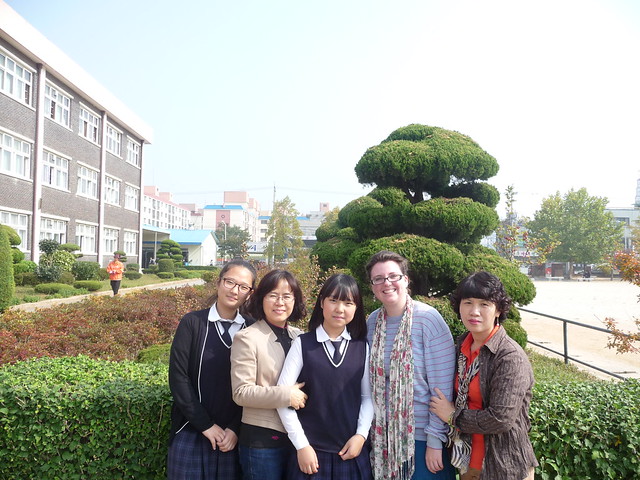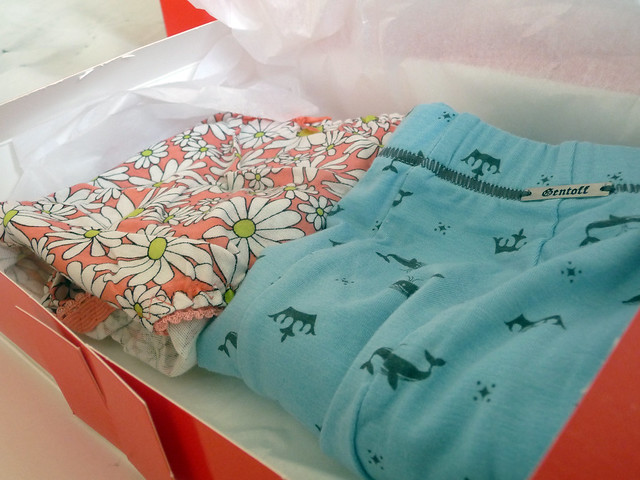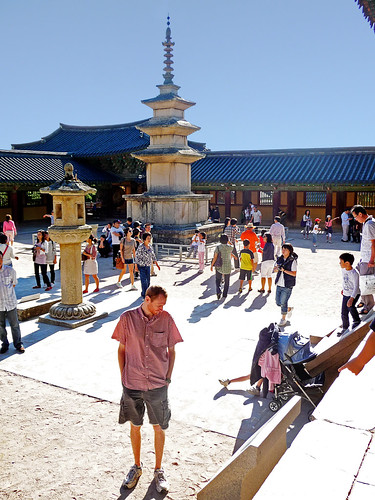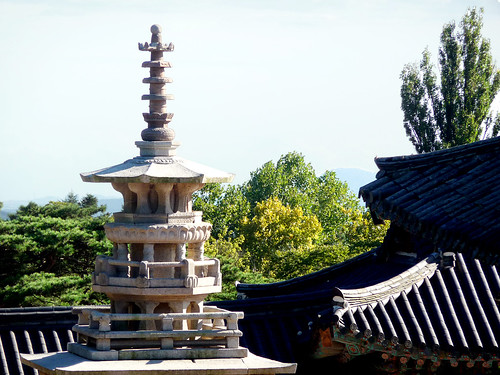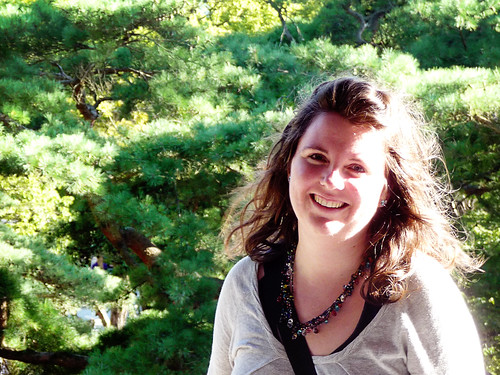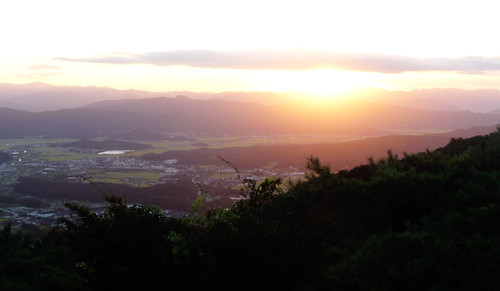asia

First of all, I would like a prize for my ability to spell 'reminiscences'. It's a skill I didn't know I had until now.
As our days in Asia have become more and more numbered, I've felt more and more suspended in a strange limbo. First watching my parents sell off all their things, pack, and then leave us in the now empty apartment. Looking out the large window at the once busy park you can tell that everyone has "flown the coop," as they say, for cooler, more pleasant destinations. Only a few locals come out and brave the oppressive heat in what was once a neighborhood hot spot.
Our plans for the next stage in our life have become somewhat firm, a firmer plan than we've had since leaving Korea, and as they are filled mostly with excitement and very little dread, I am anxious to begin. However the plane leaves on Thursday, so I must wait. And as I am waiting I am struck by the thought that I have called Asia home for about 7 years, which in my life is a very long time. I practically look upon our coming trip to England as a homecoming since I've been there a whole two times before. So 7 years is an achievement, and the most recent of those years have been freshest in my mind. All this trekking around has prolonged our goodbye to our Sweet Home in Korea. It's been easy to see Korea wherever we've been traveling, and so the final cutting of the string has been put off by our remaining. But soon the reminders will be fewer and farther between. And our once home will be placed firmly back in our memories with all the rest.
So to indulge my feelings of reminiscence (spelled it right again!) I've found a few photos of my favorite memories of Asia.
Making friends after hiking the mountain; Korea.
Lake Eunpa and the beautiful cherry blossoms; Korea.
Enjoying the view and the tea in Taipei, Taiwan.
Magical poses in Angkor Wat, Cambodia.
Somewhat scary parrot attack in Kuala Lumpur, Malaysia.
Yes, Asia, you have touched my heart.*
*Tomorrow I will have a special goodbye just for Vietnam.

“Cambodia is like Australia.”
I had been sitting on a boat in the sun all day, coming up the Mekong from Vietnam, and all those rays were making my senses feel a little bit baked. I couldn’t be quite sure if the words I thought I heard came from inside or outside my head.
“Come again?”
“Cambodia is like Australia,” Rob repeated. “People are super laid back here, and friendly. They work hard—really hard—but they know how to kick back and relax hard too, at the end of the day. I love it.”
Rob, an Aussie himself, has been living in Phnom Penh for the last several months, where he unexpectedly set up house after cycling his way up from Singapore on a recumbent tricycle and deciding not to leave. We connected through CouchSurfing.org, and he generously offered to host Marisa and I while in Cambodia’s capital… which is how I came to be sitting on his couch nibbling sweet mango while he compared the Southeast Asian nation I had just crossed into with his homeland down under.
I’ll admit that the comparison caught me by surprise. I didn’t know much about Cambodia before visiting, but the little I knew about the Khmer Rouge regime dominated my mental image: I pictured a country under a dark cloud, devastated and depressed, struggling to recover from untold horrors. Australia, on the other hand exists in my mind as a rather more happy and sunny place.
I still haven’t been to Australia, but after four weeks in Cambodia I can say that the people we’ve encountered here have indeed been incredibly laid back and friendly. People seem to smile with their whole faces on a more regular basis than I remember them doing elsewhere, and this, along with the constant performing of sampeah (bowing with palms together) creates a disarming effect. The sampeah came naturally to me (probably because of all the bowing I did while in Korea), and I caught my smile getting constantly broader under the barrage of friendliness. Soon I found myself entering into easy conversation with all kinds of people: with a woman selling cane juice by the side of the path on a rural farming island outside of Kompong Cham, who taught me several words of Khmer through signs; with a shop vendor who turned out to also be a high school teacher studying English when and where he could—we had a forty-five minute dialogue about our two countries and exchanged emails at the end of it; with Sa Vorn, our tuk-tuk driver in Angkor—a hard-working man who exudes honesty and trustworthiness… and with many others. One highlight was dining with Rob along with his Cambodian fiancé’s family, his future brother-in-law chatting away with us vigorously in pigeon English, alternating questions, jokes, laughter, and directives to “eat more frog legs!” faster than we could keep up (the frog legs, fried with lemon grass and chili, were delicious).
Dinner with Rob and his bride-to-be (before other family members showed up).
So what of the dark cloud? What of the Khmer Rouge? As I learned more about the regime I was shocked to discover that the horror was—if anything—worse than I had previously imagined. In the four years that “Red Khmer” controlled Cambodia, over two million people died from starvation, torture, and brutal killings—a full quarter of the country’s population at that time—making the period deadlier on a per capita, per nation basis than the American Civil War or the Rwandan Genocide.
An image painted by one of the few S-21 prison survivors.
Pol Pot’s communist “revolution” was the most radical ever attempted, making the Soviet and Chinese programs look sensitive and gradual by comparison: in 1975 all foreign ambassadors were evicted, schools and hospitals were closed, banking, currency, and private property were abolished, and religion, romance, and family loyalty were outlawed in one fell swoop without any kind of gradation schedule. Cities were turned into ghost towns as residents were driven into the countryside to perform fieldwork, where they were expected to produce incredible rice yields on meager rations (though many of them were lacking the most basic agrarian knowledge). Power was placed in the hands of the “pure” peasants and children, who were taught to obey all orders and use force indiscriminately, while former city dwellers and “educated elite” were considered corrupted beyond redemption, and thus expendable (excepting party leaders like Pol Pot, who were generally the best-educated of all).
One boy who was arrested then tortured and killed at S-21.
This was the high point of the regime. As the city dwellers failed to produce great quantities of rice, everything got worse. Rations were decreased below starvation level while work hours were prolonged, and violence escalated. Pol Pot, unable to believe that his revolution could fail, suspected corruption within the party. Cadres and lieutenants were arrested and sent to Security Prison 21, where they were tortured until they confessed to working for the KGB, CIA, or Vietnamese government. Then they were asked to name fifty more conspirators (who were predictably brought in next) before they were taken to the killing fields. Their wives and children, charged “guilty by blood,” were also killed (the children usually by beating their heads against trees). These killings were mostly carried out by "pure," barely adolescent teenagers. In the countryside the educated were asked to step forward for “forgiveness,” then beaten to death, while everyone everywhere starved. If the Khmer Rouge had not antagonized Vietnam to the point that the Vietnamese army invaded in 1979 to topple the regime, it is likely that the Cambodian population would have been totally exterminated within a matter of two or three more years, Pol Pot left alone in his utopia, atop a monstrous pile of skulls.
Skulls of victims at the Choeung Ek killing fields.
This is what the kind, smiling, laid back people here have been through. Since the deadly regime was toppled things have been infinitely better in the sense that people aren’t dying by the thousands, but in many ways Cambodia is still in the early stages of recovery. It took decades to rid the country of the last Khmer Rouge insurgents (whom the American government supported gainst the Vietnamese into the 1980s, and who were active into the mid-90s), and the country is still littered with millions of land mines laid to keep those insurgents at bay. Despite a UN attempt to promote fair elections in 1993 the current government remains an offshoot of the one installed by the Vietnamese in 1979, rather than the people’s choice, and is largely irresponsible and unresponsive, making little attempt to meet its nation’s basic health and education needs, relying instead on foreign aid (much of which seems to vanish as it enters the country). Corruption is rampant and widespread (with Transparency International ranking the country in the bottom 1% in their worldwide corruption index). Many former Khmer Rouge leaders and cadres are in powerful positions in the current government, and many more live ordinary civilian lives, having never been asked to account for past deeds. In 2006 an international tribunal was established to try the most senior KR leaders, but it has met with numerous bumps in the road, and only one person has been convicted to date, with their sentence now being appealed.
After the bows and the smiles and the gracious hospitality, these realities did come out in my discussions with Cambodians. In hushed tones people asked me if I had visited Choeung Ek, then explained how they were attempting to process the horrors of their country’s past. “How could this happen?” They asked me. “And why?”
As if I could provide any answers.
“This past is not taught in our schools,” said Sa Vorn gravely, before going on to tell me of Cambodia's widespread corruption and how it affected his job, along with other grievances he had with the government. Then he smiled, picked up the English grammar book that he spends all his spare time studying, started up his tuk-tuk, and drove us on to the Bayon… one of Angkor’s largest and most impressive temples, built by Cambodia’s most beloved King at the height of their empire’s splendor. The sun was just rising, and there was not another soul in sight.
Sa Vorn, studying his English while he waits for us at a temple stop--no kidding, that's a grammar book.
And this has been my experience of Cambodia. Learning about one of the worst autogenocides in human history while interacting with some of the nicest, most laid back people I’ve ever met, in the shadow of a staggeringly majestic bygone era. I don't know if Cambodia is like Australia, but it certainly isn't like any place I've ever been.
This, again, is why I travel.
The Bayon at sunrise.
Related slideshows:
Bonus! A few interesting facts about Cambodia:
- Buddhism is the professed faith of 95% of Cambodia's population, which is the highest percentage of Buddhist believers in the world (tied with Thailand). All Cambodian men over the age of sixteen are expected to serve some time as monks as a kind of right of passage.
- Cambodia's chief cultural influence is India, rather than China.
- Unlike neighboring languages like Thai, Lao, and Vietnamese, Khmer is a non-tonal language.
- While Cambodia has its own currency (the Cambodian riel), its use is limited mainly to pocket change, with the country's main legal tender being the US dollar (which all ATMs dispense--at amounts up to $2000 per go!). Generally you pay for things in dollars, and get any change less than $1.00 back in riel.
- Cambodia is the cheapest place in the world to buy certain electronics, notably Apple products, high-end cameras, and other items with relatively determined retail values. Prices are typically equal to their counterparts in the United States (where electronics are still cheaper than most "hyped" locations in Asia due to market differences), but have the advantage of being completely untaxed to everyone.
- Cambodians like their beer with lots of ice. Which of course makes sense for a country with Cambodia's climate.

I will remember many things about Taiwan.
I will remember being wet, a feeling that characterized much of the first half of our trip. Walking around Taipei in raincoats every day for a week. Waking up at Fulong Beach to the sound of rain on canvas, enjoying the sound, then slowly coming to realize that the reason my head was cool was because our tent's waterproofing had failed under the relentless downpour. Waiting for the rain to stop, only to have it start again as we hiked through the jungle; making covers for our packs out of garbage bags. Being happy to finally make it to a Buddhist temple where we could spend the night and take refuge under a solid roof.
I will remember Taiwan's beautiful and remote east coast. Hiking the historic Caoling Trail and not minding the rain, because the climb made us hot, and because our surroundings were gorgeous... being surprised at the drastic change in vegetation as we gained altitude. Seeing a truly giant spider outside a small trail-side shrine, dedicated to one of Taiwan's host of Taoist deities. Spending the night on the beach at a small lighthouse village; waking up to the sight of seaside cliffs, and our first sunny day. Hitching a ride later that day in the back of a pickup and thinking there was nothing better than the breeze in my hair, the sun on my face, and the ocean view beside me. Watching monkeys leap through the trees at Taroko, and being surprised that the famous gorge actually managed to live up to its hyped reputation.
I will remember the hot springs. The feeling of hiking around Taipei for days on end, then finally letting my body drop into the hot water of Beitou, an outdoor bath where we watched the sun set along with locals who went there every day. Sitting in the splendid wooden baths at Jiaoshi that exuded feng shui; baths which a Taiwanese man informed me were so nice "because the Japanese built them." Getting off the train at Rueisuei and walking for miles through farmland in an attempt to track down Taiwan's only naturally carbonated springs; thinking we were lost, then finally making it to the Rueisuei Hot Spring Hotel, where we were the only guests of an eclectic Taiwanese family that loves Harley Davidson. Showering in iron-rich spring water that turned our hair orange.
I will remember Taiwan's myriad temples and shrines, Taoist, Buddhist, and Confucius; the Taoist temples overflowing with color and ornamentation, gaudy yet earnest... their Confucian counterparts stark and simple by contrast, manifesting the teachings of old Master Kong. Everywhere we went, no matter how remote, or how busy, somewhere close by incense was burning, somewhere close by someone was bowing in prayer. On the hiking trail, next to a tree: there was a shrine; in Taroko under a bridge: there was a deity waiting; across from a farmer working the fields in Hualien county: there was Matsu, face black from decades of incense.
The temples are tactile places: rough wood pillars sprout up from rough stone floors, large iron pots for incense are cool to the touch, giant wax candles are smooth and shiny to look at; smoke rises in puffs, chants float on the wind, and inside a doorway, through the haze of the incense, you can make out the shapes of fruits and candies which gods like to eat. To your right a woman cleans cubic feet of wax from cubic feet of candles; to your left, a man gives incense to his three year old daughter and tries in vain to guide her in its use. And that is why I love the temples: they are so old, so alive, and there's so much going on; they are places where sitting and waiting, watching and listening, waiting and touching are greatly rewarded--there's nothing quite like running your hand across a stone that ten thousand people have stood on to pray, that served as ballast on a ship bringing immigrants from China 300 years ago, in a country that's made up of ethnic Chinese who don't consider themselves part of the Mainland.
I will remember so many "little" things (if one is heartless enough to give memories sizes): more scooters than I've ever seen before, more dogs per capita than I've ever seen before, more dogs on scooters per capita than I've ever seen before. More bubble tea, cheaper bubble tea, better bubble tea, and more kinds of bubble tea than I have ever drunk before. More monkeys jumping in my lap than have ever been in my lap before. More stinky tofu than I've ever smelled before. More helpings of chicken feet than I've ever eaten before, and also of New Zealand oatmeal (oatmeal making a cheap breakfast, being very popular in Taiwan, and much of it imported from New Zealand).
I will remember the food.
And I could go on. But of all the memories, the ones that I will recall most fondly are of all the times that people helped us; all the times that strangers were kind to us without reason. In Taipei, getting lost, and a woman offering to help us as soon as my map was halfway out of my pocket. In Nanao, a man giving us directions to the local hot springs, then coming after us half an hour later on his scooter, because he had remembered that the springs were closed for construction. Later, going down the wrong remote road on the way to a train station, and having a mother and daughter stop and offer to drive us wherever we needed to go; offer to take us to an alternate hot spring, to an alternate town, to an alternate train station (because the one we were headed to wouldn't take us Town X); offer to host us in their aboriginal village. In Hualien, stopping for dinner at a street-side restaurant where no-one spoke English, only to have a passerby stop his scooter to have a conversation and help us out (a Los Angeleno who was back in Taiwan for military service); turned out to be a Buddhist restaurant with excellent vegetarian cuisine.
The next day, waiting for a taxi to the train station, a passerby introducing himself, asking where we needed to go, and informing us that taxis were rare, but he'd be happy to drive us to the station (or the next town, if we wanted--they have a great beach there, he said). In Taroko, monks under a pagoda insisting on sharing their lunch with us, delicious honey-bread dessert included... they were returning to their monastery after visiting a friend, and had plenty, they said. Never having to wait for more than one or two vehicles to pass before getting picked up for a hitched ride. Having one older man who hitched us and spoke little English take us back to his home and his family, where he insisted on serving us lunch; "so young," he said, when we told him our age... how I wished I could ask him what he had been doing at twenty-five--what his dreams had been, what he laughed at, what he thought of how life had turned out... but all I could do was touch my beer can to his, and drink.
Then there were the Mao-Maos and the Changs, Taiwanese families who hosted us for three nights in Tainan and Taichung, respectively, and treated us like long-lost family members--despite knowing nothing about us except what I'd posted on CouchSurfing.org. For our arrival the Mao-Maos prepared a special meal of chicken-feet and ginger rice, and in the morning Mrs. Mao-Mao wouldn't let us leave the house until we had been properly filled with rice balls and milk tea. On our second night with them, Mr. Mao-Mao insisted on taking us to an area of Tainan which we hadn't managed to get to, treating us to "special food," and attempting to show us his favorite sights (despite the fact that it was unfortunately late on a weeknight, and most places were sadly closed). Two days later we stayed with the Changs, and despite having only twenty-four hours with them, they managed to take us to more than half a dozen locations in Taichung and Yanli and stuff us to overflowing with delicious Cantonese and Hakka foods and deserts--absolutely refusing to let us pay for anything, they went so far as to give us presents for Marisa's parents (whom we were soon to meet in Vietnam), and when we left wouldn't let us get on the train without a packed dinner--and hugs all around.
As our train chugged towards Taipei and I ate of my packed dinner bounty, my mind wouldn't stop spinning: who were these strangers, and why were they so kind to us? Who were these people who took us, sight unseen, into their homes, and treated us like family--who let us sleep next to their laptop computers and digital SLRs, and lavished food and gifts on us? As our train pulled into Taipei Station--a place that felt strangely like home, because we spent our first days in Taiwan there--I had no real answer. As I sit here at my parents-in-law's home, having just arrived in Vietnam, I still have no real answer. But what answer am I looking for? Part of me seems to believe that these kind folk we visited must have secret identities: that they are the Batmans and the X-Men of doing good--kind people who have planted themselves in wait for us, to achieve some special purpose. But I know that is not true--I have had too many encounters with too many kind people in too many countries, and I don't believe in Batman. No, these people are just ordinary people, and that reality is a large part of why I travel: because for every terrible story my grandmothers have related to me from newspapers or television, of physical violence, or kidnapping, or theft... for every one of those, there are two, or three, or four stories of someone in the world who's been unreasonably kind to a stranger... and it gives me hope to be part of those stories--now on the receiving side, but I hope, throughout my life, to be on the giving side as well.
"Kindness begets kindness, trust begets trust, hope begets hope"; It's one thing to see that as a nice, clichéd sentiment, but another thing entirely to experience the reality personally in a way that I can't deny. Have I experienced kindness from strangers before? Have I offered it to them? Certainly. But one forgets, I forget. Not that it happened, but the way it felt, the way it changed me... and so the sentiment becomes a sentiment once again, becomes cliché once again, and I distance myself from the most important things in life. The vulnerability of extended travel, and the encounters that come out of it, force me back to the center.
Taiwan's official tourism motto is ridiculous, but after our experience there I can't help but like it, can't help but feel that it's exactly what it should be.

After a week of exploring Taipei, and another week spent trekking down Taiwan's east coast, Marisa and I are now holed up in Taiwan's 2nd largest city of Kaohsiung, where I'm working with my friend Simon (who's generously hosting us) to make a super cool game about rice farming! I'll be posting an overview of our trip down the east coast shortly, but for now, here's a look at one day in the process (Nov. 11), complete with trekking, hitching, lunch with our ride providers, hot springs, and beautiful views.
We started the day at our beach-side campsite on Highway 11:
From there, we walked a little bit, enjoying the clear skies (it was our first truly sunny day in Taiwan), then hitched a ride further down the coast in the back of a pickup:
We had a snack in the small town of Fongbin, walked a bit more, then hitched another ride inland a little ways, to Taiwan's Guangfu, in Taiwan's East Rift Valley (once again, try to ignore my eczema, which makes my face look gross):
The man who took us to Guangfu was kind enough to invite us in for a home-cooked meal with his family, in their house which also served as a store-front for every kind of hardware supply (and a talking bird):
At Guangfu we caught the train further down the Rift Valley...
... in search of Taiwan's only naturally carbonated hot springs, in the town of Rueisuei. The hot springs weren't quite as easy to find as we expected, but after walking several miles through farmland, and asking numerous people for directions, we finally got there!
Here's a little map of the ground we covered that day (click on it to get an interactive view, with pictures):
You can also check out more photos on Flickr.

(Note: this post is from 11/4... publication was delayed due to internet troubles).
Marisa and I arrived in Taipei eight days ago, and are leaving two days later than planned. I'll admit that one of those extra days was due to wisdom tooth complications and a resulting trip to the dentist... but as for the other day, well, we just didn't want to leave. Taipei is colorful and vibrant, and every day here has been a kaleidoscope of sights and sounds and smells and tastes and feelings.
Spending anything less than a month in a city like Taipei--with its combination of dense population, fascinating history, and unique political situation--could be seen as futile.What can anyone possibly learn or pick up or take away in such a short amount of time? Of course, that's the question that hounds this whole trip, and every trip for every traveler... so I'm glad to have launched into this endeavor with a large city: biting off what is obviously so much more than can be chewed forces me to step back, and let go; to regain perspective, and try and come to grips with what journeying is about, for me. Which is not to know everything, or see everything, or understand everything; but to see some things, to try to understand some things.
It's about finding myself in the National Palace Museum surrounded by the largest collection of mainland Chinese artifacts in the world (far more than can be displayed at any one time; the displays are on constant rotation), and reading a sign that says they were "transported here by the government"... and trying to comprehend what that means. The sign does not say the Chinese government, because Taiwan is creating, is searching for--has created, has found--its own identity apart from China; but neither does the sign say the Taiwanese government, because the artifacts were in fact brought to Taiwan by the very Chinese KMT, even if that group has since been absorbed into the Taiwanese nation. Neither does the sign explain why the artifacts were transported, or hint that they might be seen as stolen, or repatriated--though Beijing constantly hollers accusations from across the straight (despite Mao's Cultural Revolution, which likely would have seen most of NPM's treasures destroyed). We are left with, simply, "transported" by "the government."
It's about turning from that sign, with all of its underlying political nuance, to examine a jadeite cabbage, crafted during the Qing dynasty, that's stunning in its beauty and its creativity--the way the artist used imperfections in a piece of jade that might have been tossed out as useless, to complement and even enhance his vision: craft meets form and function in a brilliant display that I can appreciate a century later.

It's about leaving that museum, and walking for hours through night markets that overwhelm my senses with distilled life energy. Feeling people at the ends of all my limbs; smelling dripping fats and dripping sugars at the ends of all my nostrils; tasting things and separating the flavors out a little--green onions wrapped in barbecued pork strips, sugar donuts hot out of oil, corn roasted in a spicy sauce--before everything merges back into a primordial sea of smells and desires. A puppy looks out at me from under the arm of someone who's just purchased it.
It's about noticing Kimchi in the market, and seeing Korean flags advertise Korean restaurants, and wondering if I ever would have noticed those things two years ago, before living in Korea. Wondering how many times I walked by Kimchi in my life without recognizing what it was; realizing that that will never happen again.
It's about getting lost on a street, pulling out a map of Taipei, and instantly having a passerby stop and ask with a smile, "Can I help you? Are you lost?" How to explain that I am, but I'm not?
It's about riding a gondola out of the city, to the hills of Maokong, where I sit and drink locally grown mountain tea in the shop of a woman with kinds eyes who offers a discount and tries to communicate with me in broken English and sign language. All I can give in return is "che che", and a bow, and a smile; somehow it feels like enough.
It's about going back to the city again, riding the metro, and playing an elaborate game of sign language with a boy across the way who's hat reads "YoYo King"; his mother smiles from where she's standing by the door. What game are we playing? Only the other one knows.
It's about exiting the metro and finding a temple that was built three hundred years before the metro was dreamed of, and is just as alive and active as ever, with people from all walks of life worshipping Buddhist, Taoist, and folk deities all together. Incense burns, wax melts, sweat drops on stones that once served as ballast on immigrant ships coming from Fujian Province in China. I touch the stones; they feel old. I watch a woman in a corner bowed over prayer beads, whose hands never stop moving; she's there when I come in, and there when I leave, two hours later. She was probably there before I was born.
It's about leaving that temple and seeing a man with three Great Danes, just walking down the street as if he were normal. Three Great Danes.
It's about finding the river, and walking for hours as the sun drops low over a city that feels far away across marshland... but really the city surrounds me. Watching bikers come and go; boys playing baseball under a bridge.
It's about joining Beitou locals in their daily or weekly visit to one of Taiwan's many hot springs (supposedly one of the primary reasons Japan lusted after the island)... letting the sweat evaporate and the miles of walking fade, as I descend into the water, lean my head back to watch Taiwanese clouds turn into Taiwanese sunset... then look down to notice a young girl smiling at me from across the pool. Isn't this great? her eyes say. Yes it is, I return, with my smile.
Yes, Taipei has been great, and I would like to stay longer. But I also want to get out. Because large cities, as interesting and exciting as they can be, tend to take on a life of their own, tied to but separate from the countries that contain them. I want to see more of Taiwan, as it was before Taipei, and is outside of Taipei. So tomorrow we leave the city behind for a trek down the country's east coast, the last region to be subdued by Taiwan's former colonizers, and the least developed region to this day.

I was reminded of the importance of balancing context with immediacy today, as I observed a child observing Ranbir Kaleka's multimedia installation, "He Was a Good Man." The piece itself is a fascinating one, if a bit slow-paced: we see an oil painting of a man in the foreground, intently focused on threading a needle... gradually, the painting comes to life: the man's image takes on warm tones, and we see that he is breathing; likewise, the background starts to shift, and change, revealing images from the man's youth; wait long enough, and you see the scene become a painting once again... curtains are drawn back, and shadows of observers come and go; from the background, a voice: "he was a good man." It is a subtle piece, interesting precisely for its slow pace and quiet rhythm; for its self-awareness, and its multidimensional treatment of life and art and observation.
Anyway, this child in front of me lost interest in the work "proper" somewhere between the original painting and its coming to life... whether he would have been inspired by the final act with the shadow observers is anyone's guess (though I have my doubts). He watched the image for a while, then took from his pocket a piece of transparent plastic (a magnifying lens, supplied by the museum to help with reading their miniature brochures), and walked as close to the needle threading man as he could get... lifting the plastic, he turned it this way and that, so that it refracted the light from a distant ceiling and sent it scattering across the virtual painting. He smiled, gave the plastic a few more twists, then put it back in his pocket and went sidling off to the next exhibit. His experience of the piece was different than mine; for him, the context of the work was immaterial... even its content was largely irrelevant: it was his very individual interaction with it that mattered. For me, on the other hand, context is paramount... which, I suppose, is why I'm in Taiwan to begin with.
People ask me why I can't make games about distant places from the comfort of my living room... why I need to actually travel to make games about Taiwan, or Laos, or Vietnam. As I sit here in a cramped hostel room that looks more like a dungeon cell than a livable space, my few pieces of clothing hung up to dry after a spill in the mud, I'm asking myself the same question... certainly my living room (if I had one) would be more comfortable to inhabit... certainly a desktop computer and consistent access to an internet connection (to say nothing of power outlets) would be more practical and efficient for coding games... certainly a larger wardrobe (and washing machine) would be great for when I fall in the mud. But the enterprise would be lacking context. When I can look out the window and see Taiwan, I feel Taiwan. Which is not to say that I have any illusions of knowing the place in a deep kind of way--I'm a passerby, not a resident with roots and connection--but the sense of context I get from being here is still powerful for its ability to drive and and inspire me... in that way, I suppose, its completely subjective. I don't know if I could make good games about Taiwan from a living room in Korea or the USA, and I don't know if I will make good games about it while I'm here; what I do know is that I lacked the energy or desire to start in on creating anything about the place before I got here... and now that I've arrived, I'm engaged in a way that I wasn't before. Seeing the people, hearing the language, smelling the air, getting lost in back alleys... all of it makes Taiwan feel real and three-dimensional to me in a way that paper and celluloid alone cannot. I lust for context.
Which is why I was at Taipei's Museum of Contemporary Art today. And why this post is ironic. Because I went to the museum to see contemporary art by contemporary Taiwanese, only to find that it has no permanent collection, and is currently showcasing the work of contemporary Indian artists in a collection of exhibits called "Finding India." Which is where Ranbir Kaleka and my young light-scattering friend come in. I struggled at first to find meaning and connection as I wandered through rooms full of works by Anirban Mitra, Nalini Malani, and their peers... why was I here viewing Indian artwork on one of the five days I have to explore Taipei? How was this helping me to understand or appreciate Taiwan? It's one thing to view art from India when it comes to your homeland, but how does one process art from another country, while traveling in a third?
Colors and images, names and titles passed by, and none of it meant much to me--until I saw the light scatter from my young friend's magnifying lens, and saw the look of joy on his face as he reexamined the image in front of him: the old man threading his needle, now in a shower of light. It struck me then that my preoccupation with context was doing me a great disservice... that I might be in Taiwan, but here was my chance to learn something about India, about a few of the artists who live there and what they want to express. This boy with his plastic had been getting more out of the artworks than I had, until I was able to shelve my desire for context for a while, and take in the displays on their own terms. The context of the pieces was still more important to me than it was to that boy--in terms of their Indian origin, and the artists who created them--but I was able to set aside what was for me the incoherence of experiencing those pieces while traveling in Taipei.
At the end of the day Marisa and I ended up "finding India" for over three hours, and I'm very glad we did. Later we took a packed MRT to Shinlin Night Market in order to continue finding Taiwan...

Our first day in Taipei we went to the National Palace Museum where they house all the Chinese treasures that they rescued (or stole) from China when they fled the communist take over. Likely the communists would have destroyed everything, so it's probably for the best that they took it. But the fact that the best collection of Chinese artifacts is outside China (somewhat at least), must kind of annoy some Chinese.
The coolest thing we saw was this jade cabbage

I think maybe we were in Korea for too long.
Here we are outside the museum. Luckily we have rain coats.
The second best part of the museum was feeding the Koi.
They were starving.
Really, really starving.
Jordan was also starving when we discovered a food court near our hostel that has all the food you could want.

Yesterday I walked around Sweet Home for the last time, as Gunsan Education Office employees removed the last of the government-supplied furniture. The place was much as we had found it two years ago, but somehow looked a little less pregnant, and a little more abandoned. The wallpaper was new back then (though just as floral), some of the furniture was already in place, and of course we were arriving, instead of leaving: bringing through the door some hopes and expectations (would we have a tub to shower in, fingers crossed?), but mostly just energy and excitement, and a little bit of luggage.
Sweet Home without us.

We're up bright and early this morning to say goodbye to Jim and Carol, whose apartment we've been staying in the last couple of days while we moved out of our Sweet Home.
You can see the fantastic floral wallpaper that we've been sleeping with for the last two years. Life without it is kind of boring, and perhaps that is how the rest of the world will feel after we leave Korea. Probably not, but there will always be something special about Korea for us. And notice that this is also the only time in two years that we wore our shoes in the house.
Jim and Carol, who are from New Zealand, were kind of enough to fix us a delicious lamb roast for one of our going away meals.
This is the amazing view from their 15th floor apartment. Our apartment is amongst the ones you see in the distance. The best view of the Dream Hub I think. A great to one to to remember as our last view of our home for two years.

Our trip to Naejangsan National Park to see some fall leaves.

The only thing I have had any forewarning for in the two years I've been in Korea is for the speech I had to give at yesterday's morning meeting. They gave me two whole days to think about it. I think I did a good job. I said my one word of Korean and everyone clapped. I said some more words in English, but they obviously weren't as good as the Korean one.
My students have been writing me goodbye notes, all of which have been wonderful, even the naughty boys have taken a time out to write about how they love me and will miss me. It's great leaving Korea because you can really embrace your inner corniness and say whatever you feel because the Koreans do exactly that times ten (or "x thousand" as my students write in their notes).
I got some going away presents yesterday. The best definitely being the couple-set underwear for me and Jordan from the ladies in my conversation class. They think that Jordan and I are the cutest because we love each other. I'm not sure why there are whales and crowns on Jordan's underwear.

This past week has been a big holiday in Korea, so I've had off school. We took a short trip to visit a friend of Jordan's in another town in Korea. We had a great time and got to visit the ancient capital of Korea and see some old stuff. The weather has (finally) turned cool, so it was the perfect day to be out and about.
Jordan ponders life.
Top of the famous pagoda at the temple we visited.
Marisa enjoys the sun.
The sun sets over a spectacular view.
To check out a few more pictures go here.

I've been having summer English camp for two weeks, and the highlight for me is always reading the amusing things my students post. Here are two answers to writing the conversation for this photo:
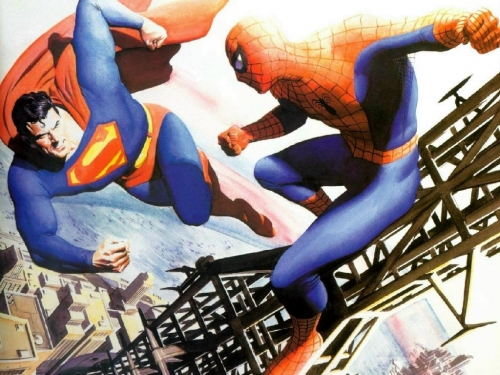
Spiderman say "superman! How are you?"

The first match of the 2010 World Cup not to end in a draw goes to Korea. We had a lot of fun watching on a giant portable TV from the entrance of a Korean bar, surrounded by a lot of hollering Koreans with drums and trumpets, who kept buying us beer and cheese sticks.
Go Red Devils!



This is where we live. Yes, it's awesome.

So after being delayed for several weeks, spring finally came, and with it the world's most beautiful sight (site? which one is it?): cherry blossoms.
There is nothing prettier in the world than a street filled with cherry blossoms, except perhaps if that street is next to a lake called Eunpa. Luckily we live next to such a lake. Everyday after school I get off the bus a little early and walk down this little piece of heaven. Jordan meets me and we eat snacks as we go. It's the prime holiday week for Eunpa, so all the street snacks are out. Our favorites include chicken on a stick, waffle, and lately we've found ice cream sandwiches at the GSMart across from the lake. The other day we had chestnuts and sometimes we have cotton candy. Jordan eats hot dogs occasionally and once in a while I have a corn dog. We never eat the stinky silk worm larvae (well, Jordan ate it once).
Spring not only means the blossoming of the trees and the ability to wear only half my closet to school instead of everything to stay warm, but also the fact that I get to chillax at school. If this year is anything like last year (and it looks like it might be) I hardly taught at all once we got to the last weeks of April. The first month and a half is hard work, but from here on out it's coasting time.
Luckily I am very busy running a new digital scrapbooking website: Pixeled Memories. Jordan is also very busy helping me to get it up and going. We are both very excited about it and are hoping to take over the entire digital scrapbooking community soon. We seem to have just the perfect skills to make this website and I can hardly believe that the nicest website on the internet is mine. Jordan also recently finished a game related to the 10 Days board games, although it's not posted online yet, so we'll let you know when that's up.
And that is a brief update of life in the Dream Hub, even dreamier now that we have our very own Subway and Coldstone.
If you want to take a peek at lots of pictures of the beautiful cherry blossoms, go here.
Jordan looking cute.

To me the most interesting aspect of this video is how critical the Korean government seems to be of its own education system--Obama's compliments notwithstanding. Thanks to Marisa's dad for passing this on.

There was a bit of a todo last week about my computer. For a long time now I have been bringing my own laptop to school to use instead of the ancient, scary Korean machine that sits on my desk. I of course plug into the school's network so that I can be a part of the hip and happening things online. However, recently the network had a security update and my presence was discovered; at least they (correctly) deduced that "Marisa EEE" was me. I don't think anyone really has a problem with me using my own computer, as I have good reasons for using it, but apparently I had a virus, at least the system update had detected one.
I know that viruses are out there, but I am married to someone who knows at least a thing or two about computers, so I figured I was safe from such an infection. I showed the computer man my virus program, of which he was dubious and decided we needed to run a Korean virus scan. This gave me a little panic because you really have to watch out for Korean programs because they will dig into your computer and become impossible to root out no matter how hard you try. But I had few options, so I said okay. The virus scan scanned and determined that I was virus free. This led to some discussion, and later it was reported to me that another virus program should be run. Double cringe, will my computer ever recover from this? Second scan also declares that my computer is healthy. Another consulation is held and it is determined that you can never really trust a foreign virus scanner (of which only the first, the one that I use, is one), so we'll try yet another virus scan. At this point I have really given up hope on my computer ever working again, and to at least make me feel like it was all worth something, this virus scan also came back with a clean bill of health. Computer man then tells me (through my coteacher) that some sort of reformatting will be necessary to rid my computer of this super stealth virus (which at this point I have decided is a figment of the system update's imagination).
When I relate this story to Jordan he of course says it's ridiculous, especially since he's the one who will have to reformat my computer. But, and this is the point of the story, I reminded him that before we start making big warpath type plans, we should remember that in Korea, whenever someone tells you something bad and/or crazy you are best off ignoring it. Because 10 times out of 10 whatever has just been told to you will never happen. And today, when I tiptoed back to school after the weekend and plugged my computer in it was allowed to connect to the internet (after being banished the previous week due to its "virus"). No mention of anything from anyone about anything, everything was just back to the way it was. And so, once again, "ignore it and it will go away" proves a successful way of life for the foreigner in Korea.

The first lesson in our book this year is about making goals. So, of course, since I always like to stay on topic in class, I had my eighth graders write down their goals for the year. Here are the best ones:
"I want to grow at least 7cm this year. This will make me better at English."
"The first goal is to grow up. The second goal is to score up."
Despite the fact that I never would have thought of it as a goal, about half my student's goals were to grow. A lot of milk will be consumed this year in the middle school.
"I hope to new world children. I hope to grow at least 3cm this year. I hope to rule the world. I hope to become a demon."
And how will they do this?
"I will get up early. I drink milk. I need to be stronger than before."
"My goal is musician. Because of I like listen to music. I am goal very fantastic.
Um...always all day long study music!! many listen and many study!!"
"My first goal will make a battle ship. My second goal is to make a B-25. My third goal is to make a B-17G."
And how will they do this?
"Not."
"My first goal is to president.
My second goal is to get up early.
My third goal is to get great grades in test."
It's good to have your priorities straight.

This past weekend we took Jed on a quick trip to Jeonju to see the traditional Hanok village. They have one of the largest surviving groups of traditional Korean houses there and it's a big tourist destination in our province. We were lucky enough to go on the same day as some sort of festival; we think they were celebrating the deity in a tree. We made a little video about our experience, some things to look out for are: jump roping, a cute puppy and Marisa dancing.

